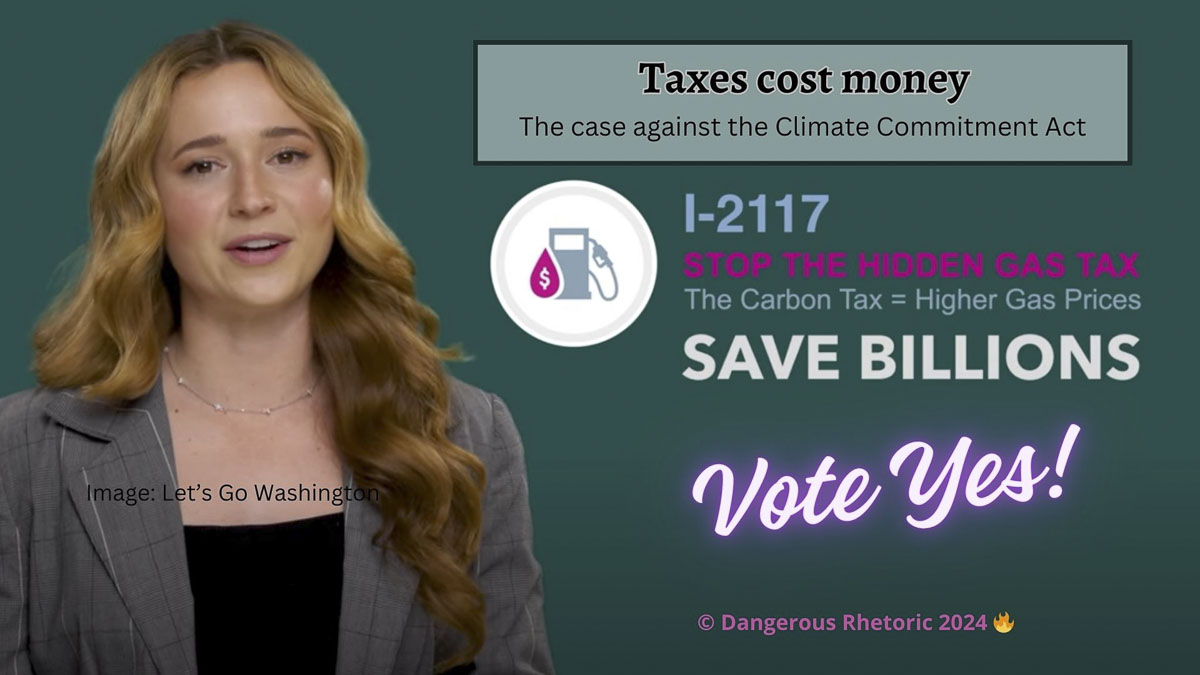
Nancy Churchill presents the case against the Climate Commitment Act
Nancy Churchill
Dangerous Rhetoric
Today I urge you “vote yes” to support Washington’s I-2117, which would repeal the costly and ineffective Climate Commitment Act (CCA). The CCA is a cap-and-trade law that taxes CO2 emissions, and artificially caps the level of emissions each year, which will continually increase the tax burden.

These taxes cost money and are a daily financial burden on Washington families, businesses, and communities without providing clear, measurable benefits to the environment. The revenue raised by the carbon tax isn’t being used to reduce carbon emissions.
According to Todd Myers and Joe Ryan, “Supporters of the tax, including oil giant BP, argue that it will reduce the state’s CO2 emissions and fund projects that help the state adapt to climate change. Instead, politicians and the state bureaucracy have used the billions they have collected in new tax revenue to fund government programs and reward political allies in the guise of environmental protection. Moreover, the state government is using taxpayer funds to campaign for keeping the CO2 tax, while regulators have banned utilities from showing consumers its costs.” Meyers and Ryan argue “It would be more appropriate to call it the ‘Climate Corruption Act.’”
Because the funds raised by the CCA are not being used to protect the environment or reduce carbon emissions, the initiative rightly aims to protect Washingtonians from unnecessary financial strain while still keeping the state’s emissions reduction goals intact.
The True Cost of the CCA
When the CCA was introduced, state leaders promised minimal impacts on fuel prices, claiming it would add only “pennies” to the cost per gallon. In reality, the CCA has added about 43 cents per gallon of gasoline and 53 cents per gallon of diesel — a significant increase.
This affects not only individual drivers but also businesses relying on fuel for transportation and delivery, from truckers to small food producers. For the average Washington family, this means paying more at the pump, adding up to hundreds of dollars a year. And it’s not just fuel; these costs are baked into everyday goods, from groceries to utilities, impacting every household budget. The regressive fuel tax created by the CCA is a major driver of inflation in our state!
The CCA targets industries that drive Washington’s economy
The CCA forces entities that emit CO2 — universities, fuel suppliers, food producers, and utilities — to purchase costly allowances at auctions for every metric ton of CO2 they emit. This practice punishes sectors essential to our state’s economy, indirectly raising prices for everyone. From energy bills to tuition costs, these increases trickle down to consumers, amplifying financial strain. Repealing this requirement would not only reduce costs for Washington’s core industries but would also help stabilize prices for consumers. If you’d like to do something to lower inflation, vote YES on I-2117.
Burdensome regulations on construction and development
Although everyone recognizes that Washington has an affordable housing crisis, the CCA unfortunately mandates an assessment of CO2 emissions for new or expanded construction. This adds another layer of red tape for builders and developers, and increases housing prices. Repealing this regulation would cut unnecessary bureaucracy and support growth in Washington’s housing market. Streamlining the process is crucial for addressing our housing crisis, especially as inflation and high living costs continue to pressure families across the state. If you think new home construction and affordable housing is important, vote YES on I-2117.
Ending disproportionate and misguided regulations on “overburdened communities”
The CCA targets “overburdened communities” with additional emissions requirements, yet the criteria used to define these communities are questionable at best. Areas like Bellevue, Redmond, and Newcastle — some of the state’s wealthiest neighborhoods — fall into this category. These arbitrary classifications divert resources and attention from genuinely struggling areas and direct them to affluent neighborhoods that hardly need additional support. Initiative 2117 would correct this misallocation, ensuring that state regulations focus on areas in genuine need, not on those who can already manage their environmental impact.
Repeal without abandoning environmental goals
If you believe that reducing carbon emissions is important, then you’ll be relieved to know that repealing the CCA through Initiative 2117 does not abandon Washington’s emissions reduction targets. The initiative leaves untouched the state’s goal of cutting CO2 emissions by 50 percent by 2030 (compared to 1990 levels). By keeping this target, Washington can continue to strive for environmental progress but without the excessive financial burdens that the CCA imposes.
If you are someone who questions the importance of cutting carbon emissions, then you’ll recognize that our artificial carbon emissions goals are most likely an unnecessary burden. The climate naturally fluctuates over centuries due to factors like volcanic activity, oceanic currents, and solar cycles. In fact, we know that throughout Earth’s history, there have been periods with significantly higher carbon dioxide levels. These epochs often corresponded with warmer global temperatures and more abundant, lush plant life. Scientific evidence for these past high-CO2 periods is found in geological and paleontological records.
Human activities, including industrial emissions, play a minor role in these larger natural processes. From this perspective, reducing carbon emissions will probably have negligible effects on climate outcomes, and therefore does not significantly benefit the environment. Nevertheless, I-2117 leaves our state’s emissions goals intact.
This smart repeal will protect Washington families and businesses
Initiative 2117 strikes the right balance between retaining liberal environmental policy goals and economic common sense. By repealing the CCA, we can ease financial pressures on families, make housing more affordable, protect key industries, and ensure that environmental efforts are applied wisely and fairly. Washingtonians deserve real solutions that make life more affordable, not policies that hinder growth and raise the cost of living. We can have greater prosperity AND a clean beautiful environment. Supporting Initiative 2117 is a step toward a more prosperous, balanced, and sustainable future for Washington.
Vote “Yes” on I-2117: Repeal the CCA, reduce taxes and keep Washington moving forward.
Nancy Churchill is the state committeewoman for the Ferry County Republican Party. She may be reached at DangerousRhetoric@pm.me. The opinions expressed in Dangerous Rhetoric are her own.
Sources:
1) Citizens’ Guide to Initiative 2117 to repeal the Climate Commitment Act, Washington Policy Center, https://bit.ly/4hiKQlf
2) It’s Time to Get Rid of Washington State’s Corrupt and Counterproductive Carbon Tax, The Climate Commitment Act is costly and isn’t helping the environment. The state can do better by Todd Meyers & Joe Ryan, National Review, https://bit.ly/40nwRVu
3) Dinosaur Era Had 5 Times Today’s CO2, Live Science, https://bit.ly/3Ynpt9N
4) Vote ‘Yes’ on I-2117, Let’s go Washington, https://letsgowashington.com/the-initiatives/#I-2117
Nancy Churchill is a writer and educator in rural eastern Washington State, and the state committeewoman for the Ferry County Republican Party. She may be reached at DangerousRhetoric@pm.me. The opinions expressed in Dangerous Rhetoric are her own. Dangerous Rhetoric is available on thinkspot, Rumble and Substack.
Also read:
- Opinion: The war on parental rightsNancy Churchill argues that Olympia lawmakers are undermining voter-approved parental rights by rewriting key legislation and silencing dissent.
- Two bipartisan bills from Rep. Kevin Waters signed into law, including one to help breweries operate their kitchen spaceTwo bipartisan bills sponsored by Rep. Kevin Waters were signed into law this week, aiming to help Washington breweries operate more flexibly and streamline OSPI’s participation on the state’s timber board.
- 6-cent gas tax hike central to new transportation deal in WA LegislatureA proposed 6-cent gas tax hike is central to a transportation funding deal under negotiation in the Washington Legislature, aimed at raising $3.2 billion over six years.
- Voters reject tax proposals in April 22 special electionClark County voters rejected all three tax measures on the April 22 special election ballot, including proposals in Camas, Washougal, Battle Ground, and Hockinson.
- In the dead of night, WA House passes trio of tax hike billsThe Washington State House passed three major tax hike bills after midnight Tuesday, including measures impacting property taxes, electric vehicles, and large businesses.










